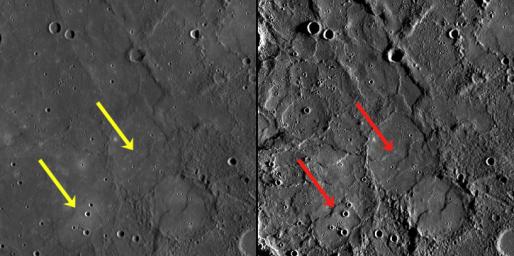Both images show the same portion of Tir Planitia, a region of smooth plains near Mercury's equator. The image on the left is part of the MDIS global surface morphology basemap, whereas the image on the right is part of the MDIS high-incidence-angle base map.
The high-incidence-angle base map is a major mapping activity in MESSENGER's extended mission and complements the surface morphology base map of MESSENGER's primary mission, which was acquired under generally more moderate incidence angles. High incidence angles, achieved when the Sun is near the horizon, result in long shadows that accentuate the small-scale topography of geologic features. Therefore, landforms such as wrinkle ridges that may not be readily visible in the surface morphology basemap (yellow arrows) become more apparent with high-incidence-angle lighting (red arrows). The high-incidence-angle base map is being acquired with an average resolution of 200 meters/pixel.
Date Created: June 01, 2012
Instrument: Wide Angle Camera (WAC) of the Mercury Dual Imaging System (MDIS)
Center Latitude: 2.33° S
Center Longitude: 187.12° E
Resolution: 500 meters/pixel
Scale: The field of view of each frame is approx. 350 km (220 mi.) across
Projection: Equirectangular
The MESSENGER spacecraft is the first ever to orbit the planet Mercury, and the spacecraft's seven scientific instruments and radio science investigation are unraveling the history and evolution of the Solar System's innermost planet. Visit the Why Mercury? section of this website to learn more about the key science questions that the MESSENGER mission is addressing. During the one-year primary mission, MDIS acquired 88,746 images and extensive other data sets. MESSENGER is now in a year-long extended mission, during which plans call for the acquisition of more than 80,000 additional images to support MESSENGER's science goals.
These images are from MESSENGER, a NASA Discovery mission to conduct the first orbital study of the innermost planet, Mercury. For information regarding the use of images, see the MESSENGER image use policy.

 Planetary Data System
Planetary Data System












